Japan's practices on promoting SDGs
2019-07-12GoldenBeeMasao SEKI0
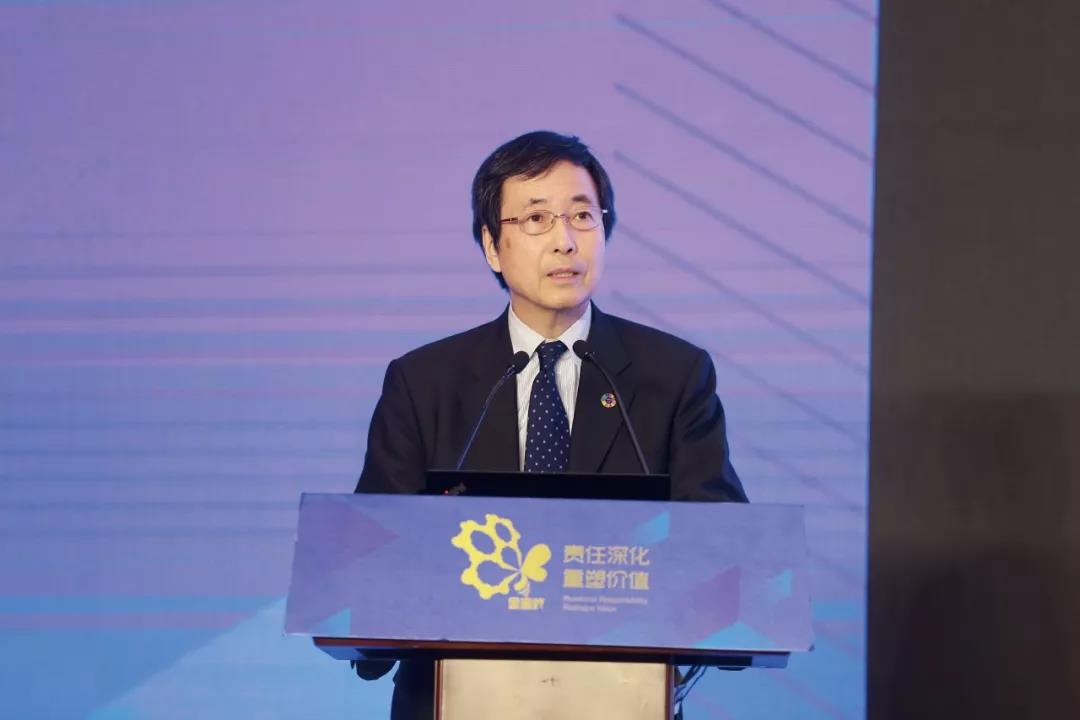
Masao SEKI, Steering Committee Chairman of Council for Better Corporate Citizenship (CBCC)
Increasing recognition of SDGs
Promoting the realization of Sustainable Development Goals (SDGs) has become the consensus of Japanese society and enterprises, and the recognition of SDGs is also on the rise year by year.
From the research results of the UN Global Compact, we can see that from 2015 to 2018, the recognition of SDGs by Japanese business managers increased from 20% to 59%. We also know that the proportion of enterprises who think that the government is most influential in promoting SDGs has decreased from 58% to 24%. On the contrary, the proportion that business should play a leading role has increased year by year.
From the research results of the UN Global Compact, we can see that from 2015 to 2018, the recognition of SDGs by Japanese business managers increased from 20% to 59%. We also know that the proportion of enterprises who think that the government is most influential in promoting SDGs has decreased from 58% to 24%. On the contrary, the proportion that business should play a leading role has increased year by year.
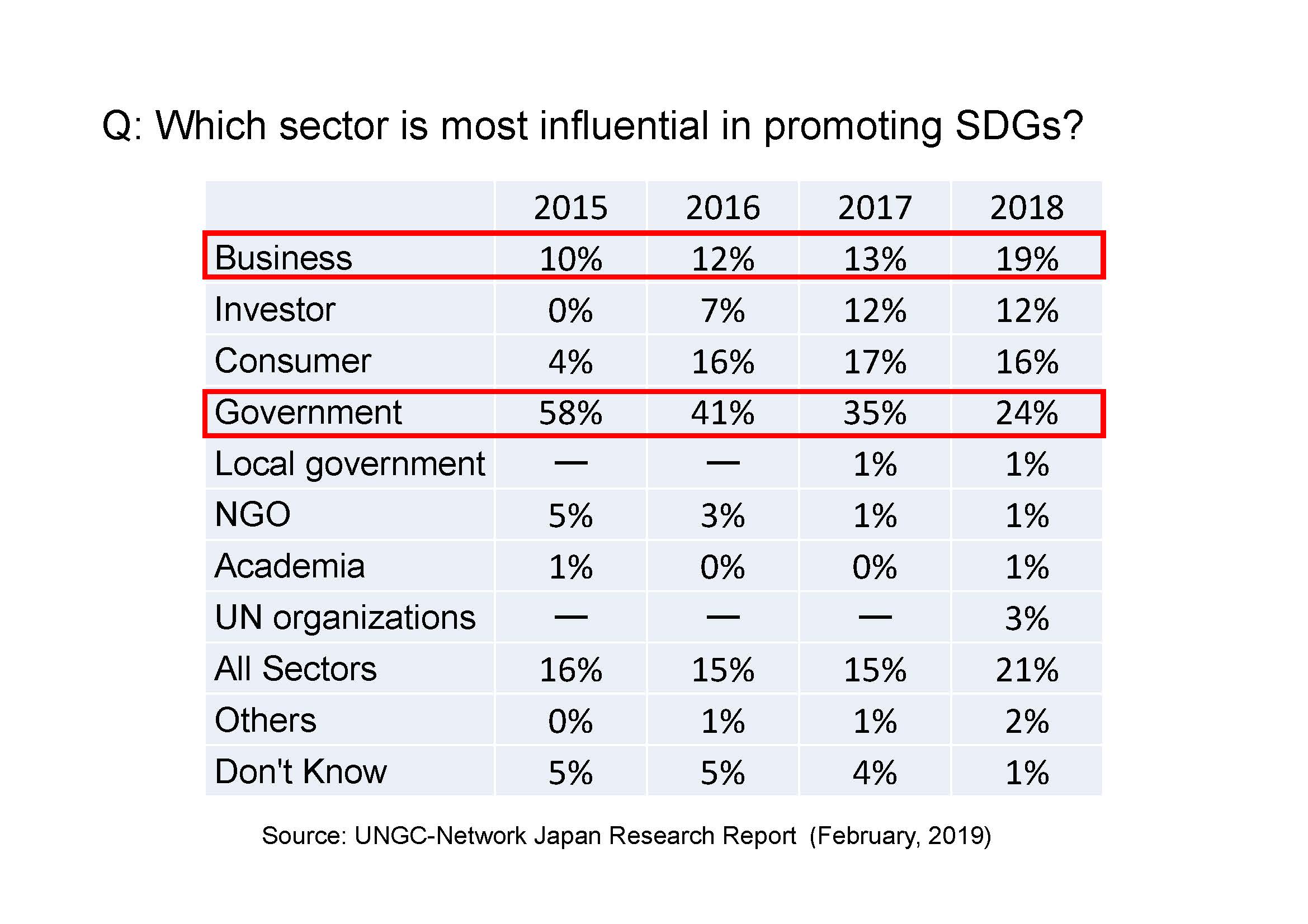
The data change also shows that Japanese enterprises have gradually raised their awareness of their main role in promoting the realization of SDGs, which further reflects that Japanese enterprises will play a greater subjective initiative in the process of promoting social sustainable development, carry out more abundant practical activities and make greater contributions.
Rapid growth of ESG investment
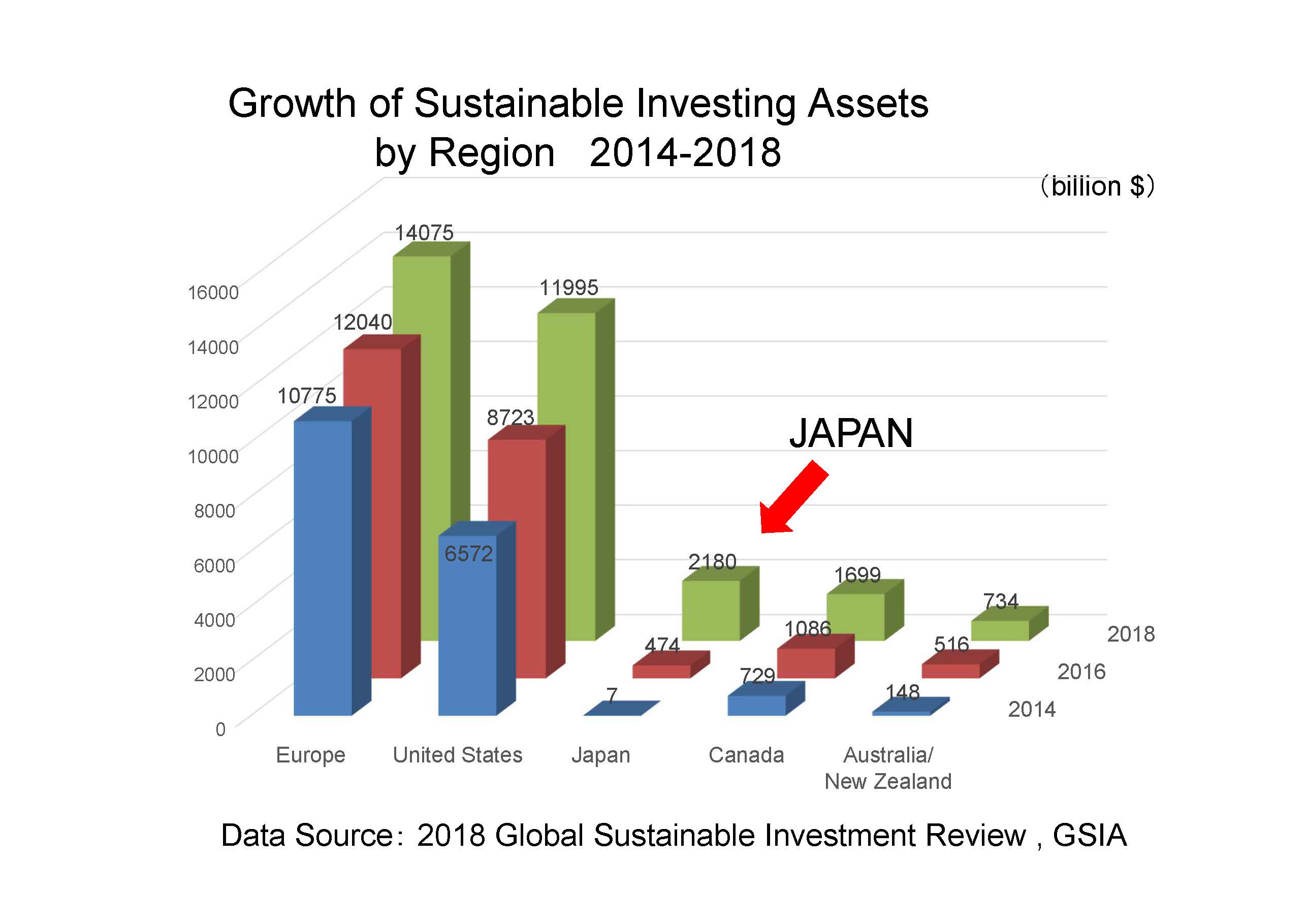

In recent years, we have observed that the Japanese capital market is paying more and more attention to the non-financial performance of enterprises, and investment institutions and asset owners are gradually turning to sustainable investment. This trend is also based on the recognition of capital market for the consensus that enterprises' performance in environment, society and governance (ESG) can be used as indicators of long-term stable operation and profitability of enterprises.
From the data, we can see that the Japanese capital market has been paying attention to and increasing ESG investment since 2014. By 2018, Japan's ESG investment has ranked the third in the world, which shows that Japanese investment institutions attach greater importance to the medium and long-term value return of enterprises, and rely on non-financial information such as ESG to judge the long-term stable development and value creation ability of enterprises.
From the data, we can see that the Japanese capital market has been paying attention to and increasing ESG investment since 2014. By 2018, Japan's ESG investment has ranked the third in the world, which shows that Japanese investment institutions attach greater importance to the medium and long-term value return of enterprises, and rely on non-financial information such as ESG to judge the long-term stable development and value creation ability of enterprises.
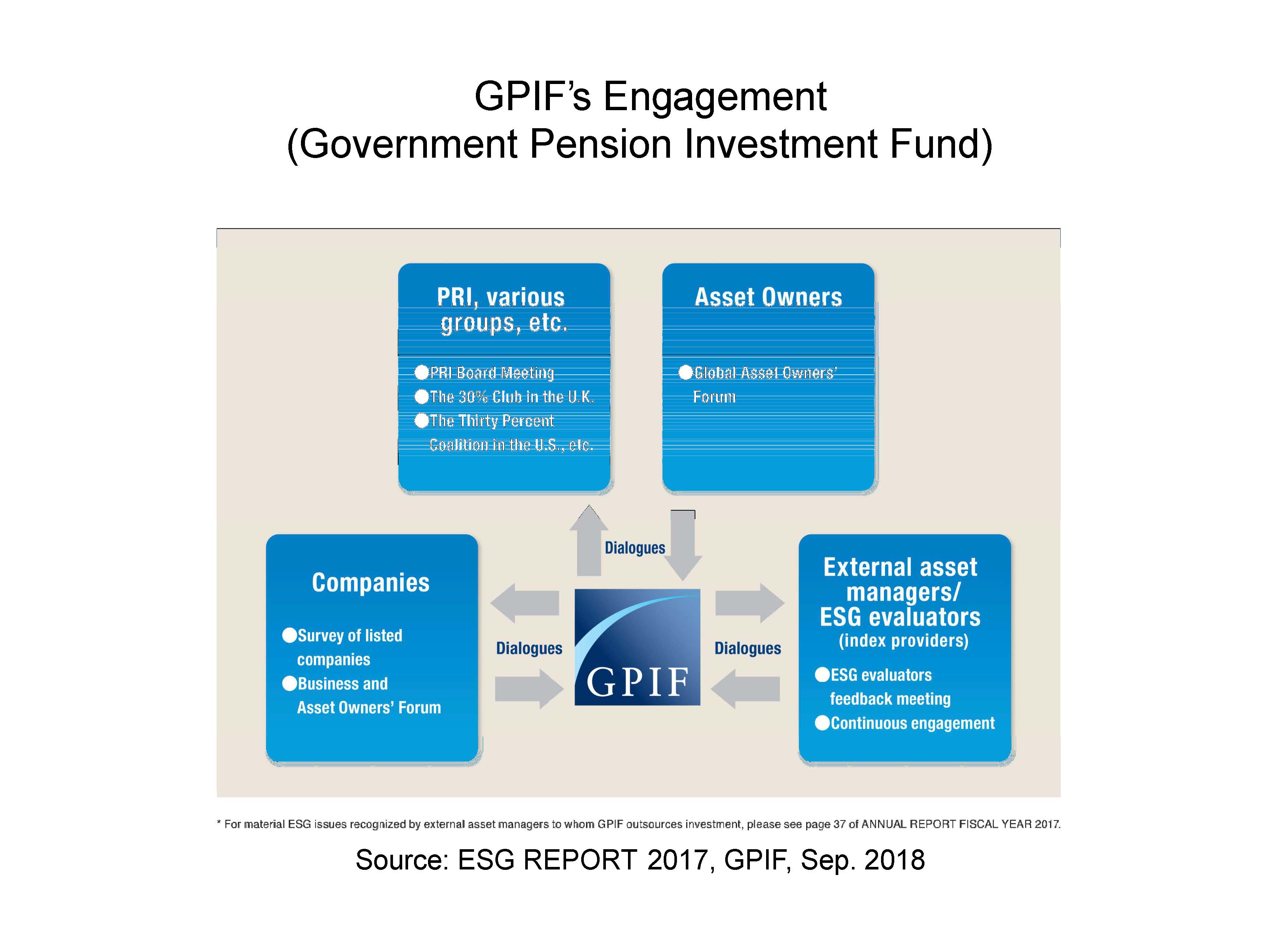
In addition, Japanese investment institutions have played a greater role in promoting responsible investment, among which the most influential investor in Japan, the Government Pension Investment Fund (GPIF), is a good example of ESG investment.
GPIF joined the UN-backed Principles for Responsible Investment in 2015, and has promoted ESG investment for all subjects with the help of the international ESG index since then. In addition, GPIF has been carrying out research and practice in the field of responsible investment. In April 2018, GPIF and World Bank Group launched new initiative on Sustainability Bonds. In June, the joint research initiated by GPIF, Tokyo University and Keidanren was officially launched.
GPIF joined the UN-backed Principles for Responsible Investment in 2015, and has promoted ESG investment for all subjects with the help of the international ESG index since then. In addition, GPIF has been carrying out research and practice in the field of responsible investment. In April 2018, GPIF and World Bank Group launched new initiative on Sustainability Bonds. In June, the joint research initiated by GPIF, Tokyo University and Keidanren was officially launched.
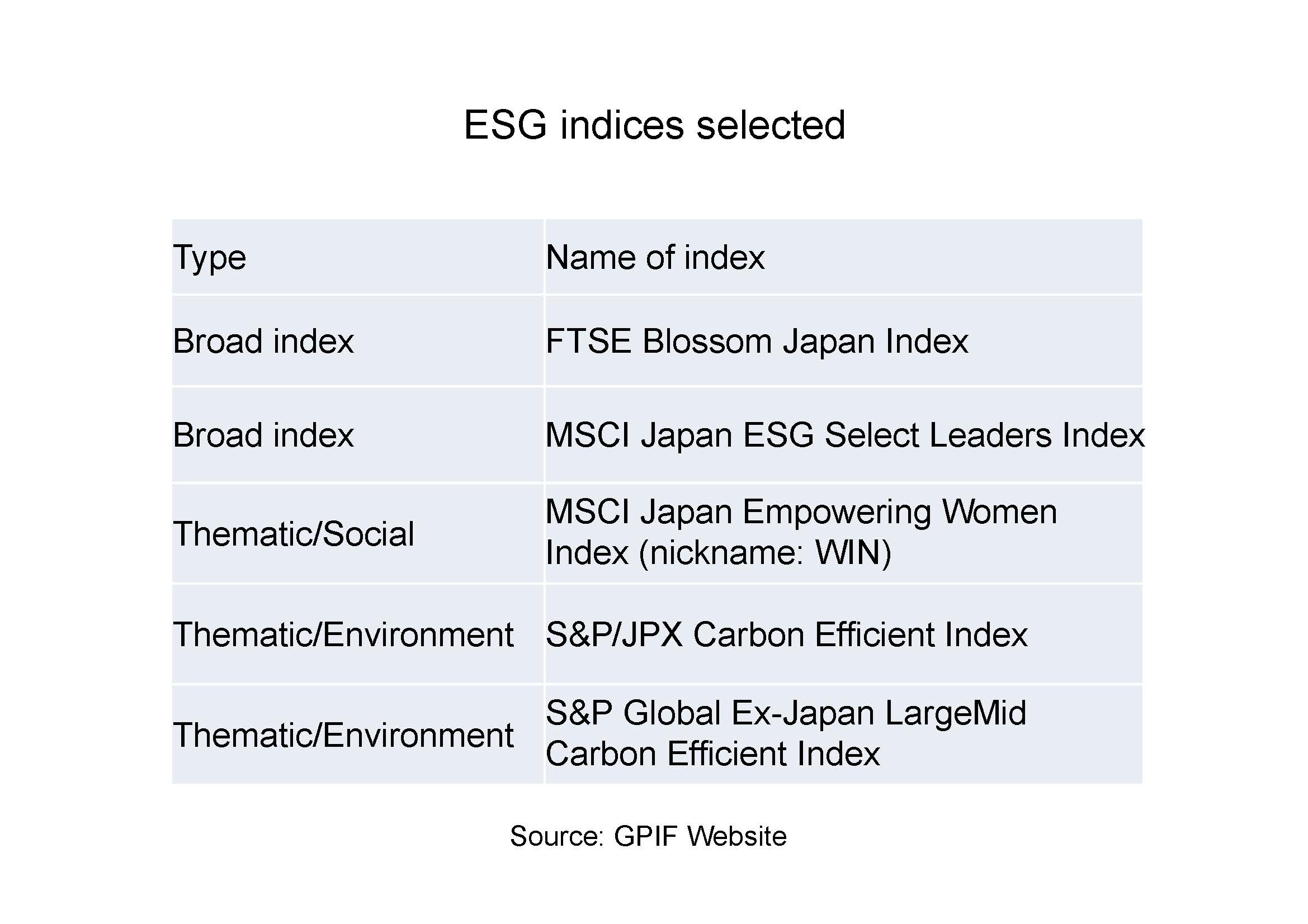
The emphasis of capital market on ESG performance of enterprises is forcing enterprises to develop and strengthen their own social responsibility practice.
Keidanren's initiative on Society 5.0 for SDGs
A remarkable feature of the CSR development in Japan is that enterprises take the lead in CSR activities over government departments or social organizations. Three years ago, the Japanese government launched the Society 5.0. As the Japanese government's conception of building a human-centered and sustainable development society, the strategy aims to solve the challenges of population aging, natural disasters and environmental pollution faced by Japan. It emphasizes that starting from solving social problems, the disadvantage should be turned into opportunities, and the "super-smart society" should be built to achieve simultaneous social and economic development.
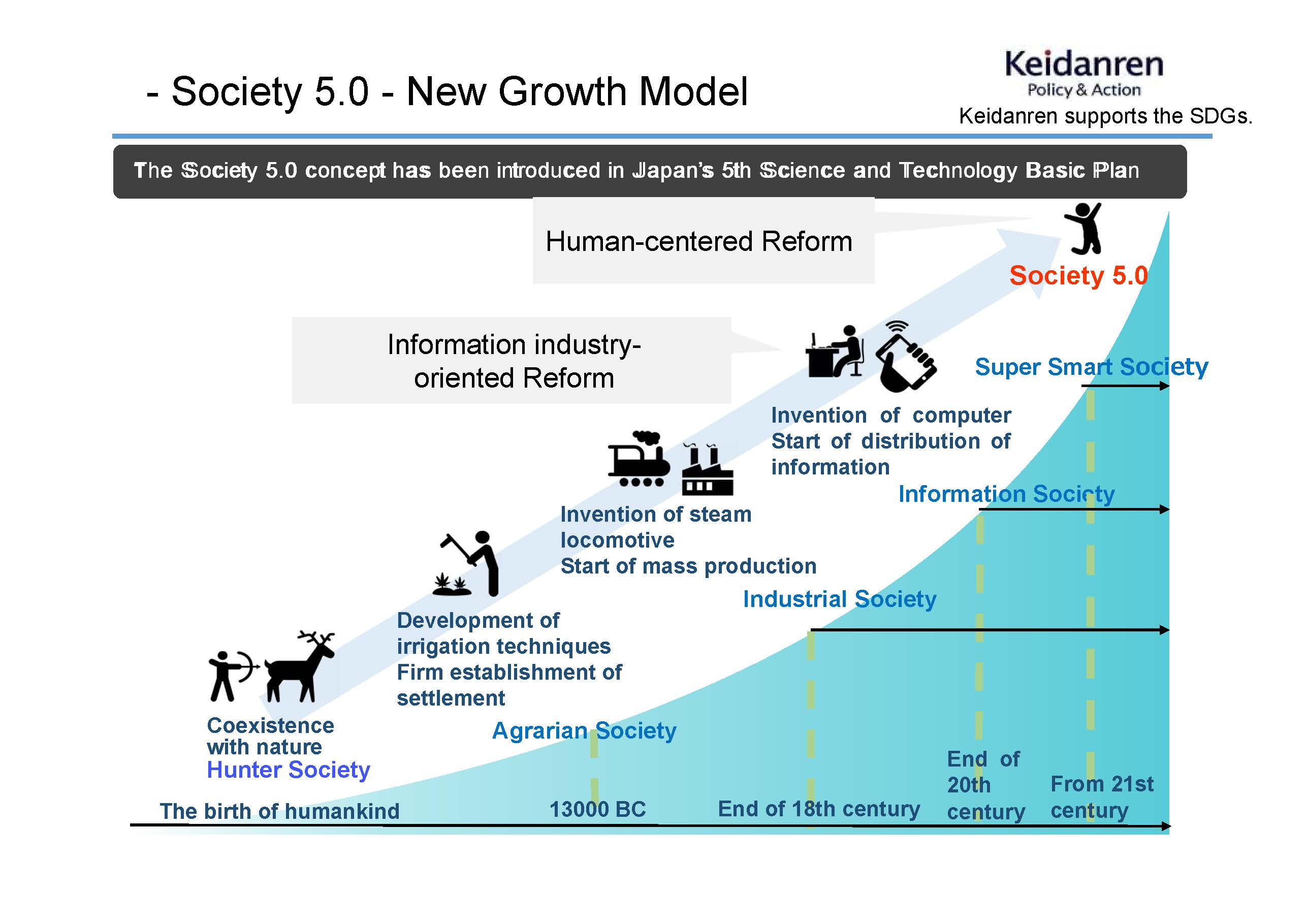
Realizing the Society 5.0 requires every enterprise to actively practice in their respective industry. With the goal of Society 5.0, Keidanren revised and promulgated the new charter of corporate behavior to guide member enterprises to carry out CSR practice in accordance with the 10 principles and contribute to the realization of SDGs.
In addition, seizing the opportunities of the SDG Business Forum at the United Nations High-level Political Forum in 2018, and the B20 Tokyo Summit in 2019 as well as the upcoming G20, the 2020 Tokyo Olympic and Paralympic Games in 2020, and the OSAKA-KANSAI JAPAN in 2015, EXPO 2025, Keidanren will work with the government to share its stance in the field of CSR and demonstrate the process of Society 5.0 with the international community, so as to encourage more social and corporate forces to participate in solving the pressing environmental and social problems and creating a more sustainable future.
In addition, seizing the opportunities of the SDG Business Forum at the United Nations High-level Political Forum in 2018, and the B20 Tokyo Summit in 2019 as well as the upcoming G20, the 2020 Tokyo Olympic and Paralympic Games in 2020, and the OSAKA-KANSAI JAPAN in 2015, EXPO 2025, Keidanren will work with the government to share its stance in the field of CSR and demonstrate the process of Society 5.0 with the international community, so as to encourage more social and corporate forces to participate in solving the pressing environmental and social problems and creating a more sustainable future.
Business and human rights
At present, Japanese society and enterprises generally pay more attention to the issue of business and human rights. For example, the new policy and action of Keidanren reflects the relevant requirements of business and human rights. It proposes that enterprises should conduct business that respects the human rights of all persons, understand and respect internationally recognized human rights, clarify policies for respecting human rights and reflect them in business activities, contribute to the creation of an inclusive society by supporting the independence of socially vulnerable people who are at greater risk of human rights violations, through collaboration with a diverse range of stakeholders.
Compared with other countries, Japan launched action on human rights relatively late. At present, National Action Plan (NAP) on Business and Human Rights of Japan is being developed and will be finalized by 2020. The NAP will focus on the empowerment of vulnerable groups, help them become more independent, and fundamentally improve the human rights status of the whole society. In order to achieve this goal, we also need to make more efforts to expand social activities reflecting human rights issues and create a more inclusive society so that Japan's human rights status can be more internationally recognized.
Fortunately, we see that enterprises have taken positive actions in the field of human rights. In June 2018, ANA Holdings issued its first human rights report.
Compared with other countries, Japan launched action on human rights relatively late. At present, National Action Plan (NAP) on Business and Human Rights of Japan is being developed and will be finalized by 2020. The NAP will focus on the empowerment of vulnerable groups, help them become more independent, and fundamentally improve the human rights status of the whole society. In order to achieve this goal, we also need to make more efforts to expand social activities reflecting human rights issues and create a more inclusive society so that Japan's human rights status can be more internationally recognized.
Fortunately, we see that enterprises have taken positive actions in the field of human rights. In June 2018, ANA Holdings issued its first human rights report.
Tokyo 2020 and Sustainability
In March 2018, the Tokyo Organizing Committee of the Olympic and Paralympic Games published the Tokyo 2020 Sustainability Progress Report, which shares the progress made so far by the Committee in climate change, resource management, natural environment and biodiversity, human rights, labor and fair business practices, as well as its participation, cooperation and communication. The Tokyo 2020 will be the first games in Olympic history which is in accordance with the “Guiding Principles on Business and Human Rights”, which will also become a practice for all future hosts of the Olympic Games.
I would like to share with you two sustainable projects carried out by the Tokyo Organizing Committee.
Recycle medal project (urban mine)
The Tokyo 2020 Games need about 5,000 medals. In order to achieve sustainable utilization of resources, the Tokyo Organizing Committee extracted precious metals from recycled electronic equipment to create medals. The project has won the support of Japanese citizens, and 90% of precious metals have been recovered.
I would like to share with you two sustainable projects carried out by the Tokyo Organizing Committee.
Recycle medal project (urban mine)
The Tokyo 2020 Games need about 5,000 medals. In order to achieve sustainable utilization of resources, the Tokyo Organizing Committee extracted precious metals from recycled electronic equipment to create medals. The project has won the support of Japanese citizens, and 90% of precious metals have been recovered.
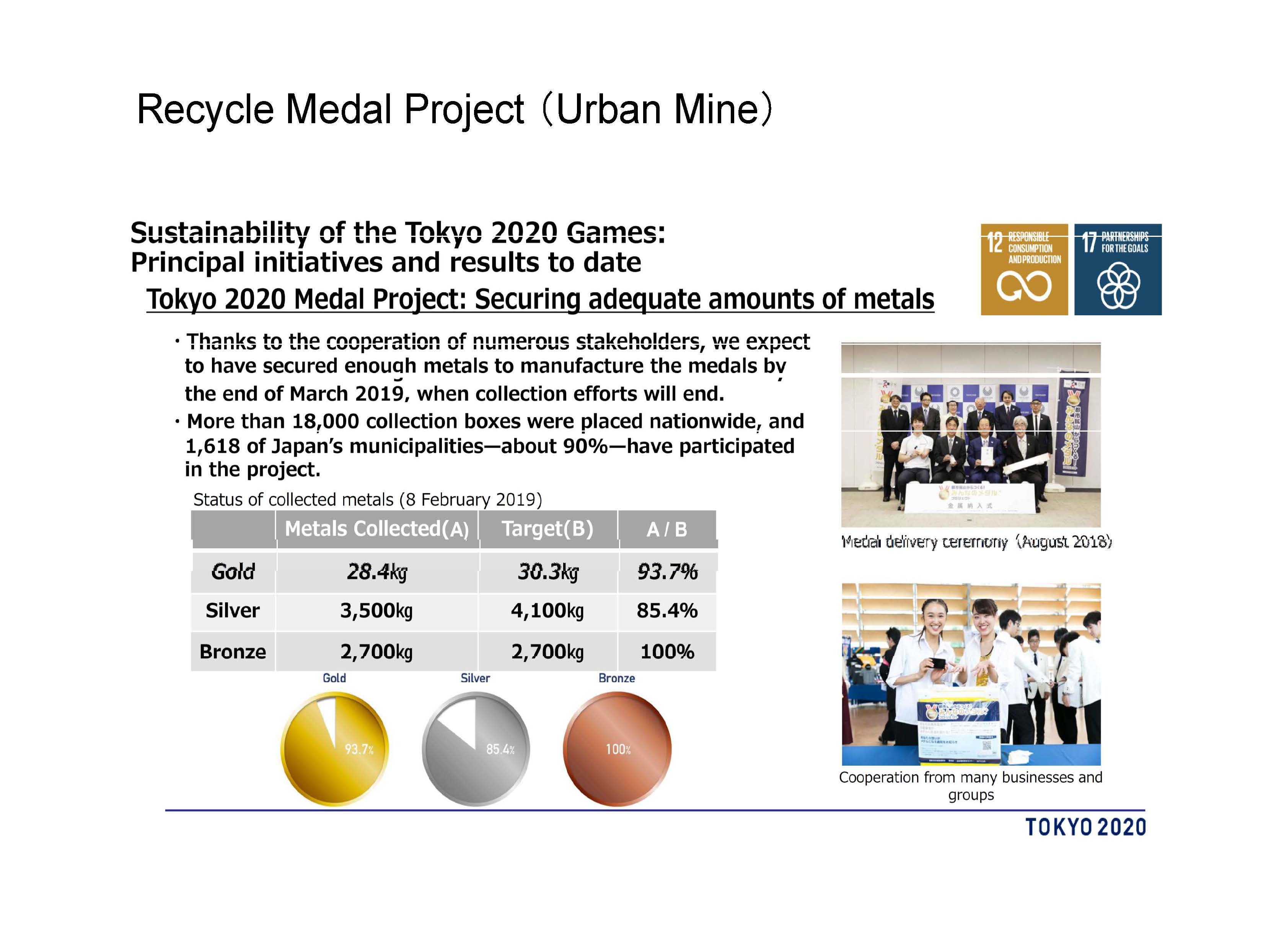
Responsible procurement codes
At present, there is no general responsible procurement standard in Japan, so the Tokyo Organizing Committee has formulated its own procurement codes for agricultural products, timber, palm oil, etc. to promote sustainable procurement, which will also become a legacy of the Tokyo 2020 Games and provide valuable experience for the future Olympic Games.
At present, there is no general responsible procurement standard in Japan, so the Tokyo Organizing Committee has formulated its own procurement codes for agricultural products, timber, palm oil, etc. to promote sustainable procurement, which will also become a legacy of the Tokyo 2020 Games and provide valuable experience for the future Olympic Games.
Best Practices
- The 100-year brand — Air Liquide also has a sense of juvenile
- Beijing Public Transportation Corporation: Developing green transportation to build a harmonious and livable capital
- CGN: Building a modern factory in barren deserts and developing a new win-win cooperation model along “Belt and Road”
Upcoming Event

All the materials on the site “Source: XXX (not from this site)” have been reprinted from other media. They do not imply the agreement by the site.
All the materials with “Source: CSR-China Website” are the copyright of CSR-China Website. None of them may be used in any form or by any means without permission from CSR-China Website.
GoldenBee Official WeChat
Copyright © Csr-china.net All Right Reserved.
京ICP备19010813号










